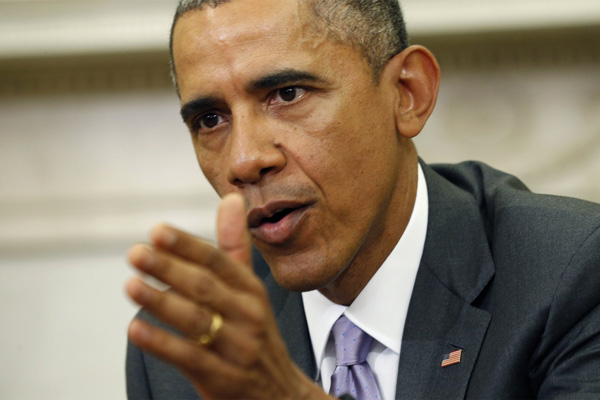Tim Mak
Beyond the theatrics of the open letter that 47 Republican senators sent to Iran, it features a core of truth: the Obama administration is negotiating a deal that cannot be guaranteed beyond the president’s current term.
The Obama administration was so outraged with the Republican attempt to undercut the president’s foreign policy negotiations that it sent the Vice President, the White House press secretary, and others to attack the letter rather seriously—instead of treating as the “cheeky” reminder of Congress’ role that GOP senators intended.
In the process of engaging, the Obama administration highlighted that any deal with Iran would be, like many other past international security initiatives, a “non-binding” agreement. And by taking this bait, the administration undercut its own credibility in making longer-term assurances about American sanctions relief.
“A non-binding agreement with Iran is easier to make (because the President can clearly do it on his own) and easier to break (because there is no domestic or international legal obstacle to breaking it),” wrote Jack Goldsmith, a former Assistant Attorney General who now teaches law at Harvard, at Lawfare on Wednesday.
The letter, which was conceived of by freshman GOP Sen. Tom Cotton, was influenced in part by prominent national security hawk and Weekly Standard editor Bill Kristol. Kristol said he had no part in drafting or editing the letter, but did consult with the senator about it.
“I did discuss it with Tom as he was conceiving it and pondering whether and how to do it. I know he consulted with others as well with some government and foreign policy experience, as you’d expect,” Kristol told The Daily Beast.
State Department spokeswoman Jen Psaki noted on Tuesday that the Iran nuclear agreement wasn’t exactly novel. Lots of previous international deals were “non-binding,” too.
“It will be the same kind of arrangement as many of our previous international security initiatives—such as the framework negotiated with Russia to destroy Syria’s chemical weapons, the Proliferation Security Initiative, the Missile Technology Control Regime, and non-security initiatives such as the recent U.S.-China Joint Announcement on Climate Change,” a senior State Department official told The Daily Beast.
Secretary of State John Kerry made the same argument before the Senate Foreign Relations Committee on Wednesday. “We’re not negotiating a, quote ‘legally binding plan.’ We’re negotiating a plan that will have in it a capacity for enforcement. We don’t even have diplomatic relations with Iran right now,” he said.
A senior State Department official also argued that “the overriding reason to prefer a non-binding international arrangement to a treaty is the need to preserve the greatest possible flexibility to re-impose sanctions if we believe Iran is not meeting its commitments under a Joint Comprehensive Plan of Action.”
Some Republicans thought twice about whether the open Iran letter was a needless agitation that hurts bipartisan Congressional efforts to prevent a bad nuclear deal.
But several days after its release, the effect of the open letter has been to clarify how precarious a deal with Iran could be after January 2017.
This raises questions about the durability of a deal that President Obama has said could have Iran agreeing to roll back its nuclear capabilities “for 10 years or longer.”
The open letter to Iran (PDF) had two points: the power to make binding international agreements required Congressional buy-in, and the fact that many of the senators would remain in office long after President Obama’s second term had expired.
“The letter forced the administration to explain why they’re icing Congress out of Iran negotiations, and now that explanation has ignited a firestorm,” said Omri Ceren, press director for the pro-Israel group The Israel Project. “The administration looks like it intentionally chose a weaker, non-binding arrangement, rather than a treaty, to avoid Senate oversight.”
On one of the letter’s core points, sanctions experts agree that an executive agreement could be undermined if the next president decides to change American policy.
“Changes the president makes now under his executive powers may not be agreeable by his successor. The next president, for example, could adopt a different posture regarding Iran and usher in new, harsher executive directives to financially constrict its access to international markets,” said Stuart Jones, Jr., a former senior Treasury Department official who now advises on matters of financial integrity for Ernst & Young in the Middle East. “Such a shift is not without precedent, however, it does project a higher degree of uncertainty around what ‘guarantees’ mean in the medium-term.”
If an agreement with Iran is reached, President Obama could make it more difficult for a successor to withdraw from the agreement by gumming up the bureaucratic works.
Through executive orders and changes in State Department organization and policy, even a non-binding agreement could strengthened. It’s more difficult to shift a policy, for example, when there’s an assistant secretary whose job depends on it.
“The President could use an executive order to advance policy, and even instruct other federal agencies to create new offices or policies within his existing authority and using already appropriated funds,” said Michael Zolandz, chair of Dentons’ Public Policy & Regulation Practice. “Nevertheless it’s still temporary… In this context, permanence is defined by the political will to change something.”
Iranian news outlets were quick to point out that the ongoing nuclear negotiations were not bilateral, and that if a future American president were to withdraw from an agreement, the United States could become diplomatically isolated.
“Iran will close a nuclear deal with the P5+1 members, of which America is only one member,” an editorial from Iranian pro-reform daily Arman-e Emruz read. “So if the next [U.S.] administration or the Congress sabotage such an agreement, America will be isolated and discredited in front of other world powers.”


